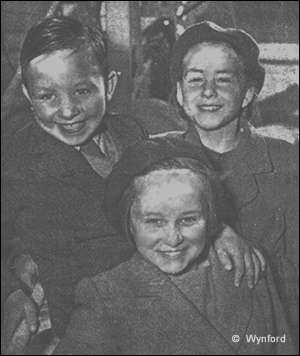Barnardo’s have been very good to my brother, sister and me. I am now 70 years old and entered their care in March 1951, coming to live in Australia later the same year. I was 12 years old, my brother was 7 ½ and my sister celebrated her 10th birthday on board the ship.
When I left school, aged 15, they put me through business college and found me good board and lodgings. They also followed me up until I turned 21.

Then it was up to me to let them know how I was getting on in the world. If I had any problems I knew I could go to them at any time for help. When I got married I had the manager of Barnardo’s Australia to give me away and his daughter as one of my two bridesmaids. I have stayed in touch with the organisation ever since and I’m extremely pleased with the care they expended to me.
I have had a very happy life, but I shudder to think what would have happened if we had stayed with our father. Five months after our mother died he married an awful woman with two daughters and she said that he had to choose between her and us three. Needless to say, he chose her.
I was in a Dorchester County Council home for about 18 months before going into Barnardo’s. It was great in the council home too. I was at grammar school and also in the local guides. I was only in Barnardo’s in the UK for a few months in order to be ‘processed’ to come out here to Australia, as my sister and brother had been with them for a couple of years.
Out here we were treated very well. I taught Sunday School at 14 years of age, sang in the choir at church and was a member of the ‘Fellowship’. I received pocket money every week and we were taken to the pictures or to the beach on the weekends. We had a swimming pool and lived in a great big two storey house on 22 acres. There was a horse for us to ride too. I was the eldest at the home while I was there. Families took us out for weekends and away on holidays. I went to the local high school for girls and we were always first in with our money for any excursions or for cooking, sewing or anything else that we needed money for. I knew of girls whose parents could not raise the money when needed for school projects and when I asked them why they had to spend time in the school library, they would say that they didn’t have the money required. We NEVER missed out on anything. As long as we took our slip of paper with the required amount to the manager’s office by Saturday morning, then we could go back to him on Sunday evening and were given the money in an envelope to take to school on the Monday. We were well fed and clothed and had a lovely home to live in, as well as lovely people to look after us. We had little chores to do to help each other, as after all there were 16 girls in our house between the ages of 7 and 15. We had fun and lots of play time.
In September 2009 I attended Barnardo’s annual reunion at Picton Showground in Sydney, New South Wales, and helped with the selling of the raffle tickets as I do each year. It is so good to meet up with the ‘boys and girls’ with whom we grew up. I can speak with confidence, on behalf of my brother and sister, as to the fact that we have never regretted Barnardo’s and the British Government’s decision to send us to Australia. We have the largest family of brothers and sisters in the world and support each other in a way no other family could do.
Wynford
© Wynford 2010
Editor’s note
For more information on how to research your Barnardo ancestor please go to Barnardo’s Family History Service.
However Barnardo’s wasn’t the only ones involved in emigration schemes to Australia, as well as Canada, New Zealand and Southern Africa. The Salvation Army and an organisation led by Maria Rye are two such examples.